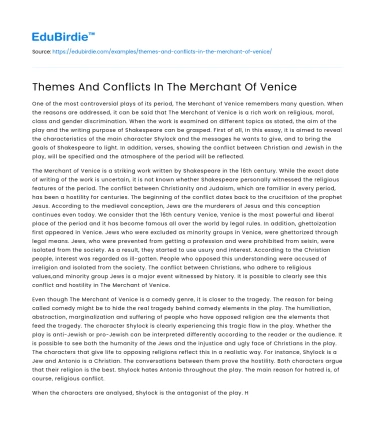One of the most controversial plays of its period, The Merchant of Venice remembers many question. When the reasons are addressed, it can be said that The Merchant of Venice is a rich work on religious, moral, class and gender discrimination. When the work is examined on different topics as stated, the aim of the play and the writing purpose of Shakespeare can be grasped. First of all, in this essay, it is aimed to reveal the characteristics of the main character Shylock and the messages he wants to give, and to bring the goals of Shakespeare to light. In addition, verses, showing the conflict between Christian and Jewish in the play, will be specified and the atmosphere of the period will be reflected.
The Merchant of Venice is a striking work written by Shakespeare in the 16th century. While the exact date of writing of the work is uncertain, it is not known whether Shakespeare personally witnessed the religious features of the period. The conflict between Christianity and Judaism, which are familiar in every period, has been a hostility for centuries. The beginning of the conflict dates back to the crucifixion of the prophet Jesus. According to the medieval conception, Jews are the murderers of Jesus and this conception continues even today. We consider that the 16th century Venice, Venice is the most powerful and liberal place of the period and it has become famous all over the world by legal rules. In addition, ghettoization first appeared in Venice. Jews who were excluded as minority groups in Venice, were ghettorized through legal means. Jews, who were prevented from getting a profession and were prohibited from seisin, were isolated from the society. As a result, they started to use usury and interest. According to the Christian people, interest was regarded as ill-gotten. People who opposed this understanding were accused of irreligion and isolated from the society. The conflict between Christians, who adhere to religious values,and minority group Jews is a major event witnessed by history. It is possible to clearly see this conflict and hostility in The Merchant of Venice.
Save your time!
We can take care of your essay
- Proper editing and formatting
- Free revision, title page, and bibliography
- Flexible prices and money-back guarantee
Even though The Merchant of Venice is a comedy genre, it is closer to the tragedy. The reason for being called comedy might be to hide the real tragedy behind comedy elements in the play. The humiliation, abstraction, marginalization and suffering of people who have opposed religion are the elements that feed the tragedy. The character Shylock is clearly experiencing this tragic flaw in the play. Whether the play is anti-Jewish or pro-Jewish can be interpreted differently according to the reader or the audience. It is possible to see both the humanity of the Jews and the injustice and ugly face of Christians in the play. The characters that give life to opposing religions reflect this in a realistic way. For instance, Shylock is a Jew and Antonio is a Christian. The conversations between them prove the hostility. Both characters argue that their religion is the best. Shylock hates Antonio throughout the play. The main reason for hatred is, of course, religious conflict.
When the characters are analysed, Shylock is the antagonist of the play. He is a stingy and greedy interest. He boasts of being Jewish, and Judaism is a source of pride for him. He is a hateful character against Christians. The major reason of his hatred against Christians is that he is a humiliated, scorned and isolated person. Antonio is the person who despises, teases and isolates him. He is a Christian trader. Because of Antonio's behavior, Shylock puts all Christians in the same equation. According to him, all Christians are cruel, dislike, disdain and despise Jews. Being a heartbroken person feeds his hatred and hostility. In court, his lack of compassion makes him a bad and ruthless character, but Shylock is seeking his right by observing the agreement. This behavior also shows that he is fond of justice. How shylock was broken, he was right to enmity against Christians, and the brutal treatment he faced can be explained by his words:
SALARINO. Why, I am sure, if he forfeit, thou wilt not take his flesh: what's that good for ?
SHYLOCK. To bait fish withal: if it will feed nothing else, it will feed my revenge. He hath disgrac'd me and hind'red me half a million; laugh'd at my losses, mock'd at my gains, scorned my nation, thwarted my bargains, cooled my friends, heated mine enemies. And what's his reason? I am a Jew. Hath not a Jew eyes? Hath not a Jew hands, organs, dimensions, senses, affections, passions, fed with the same food, hurt with the same weapons, subject to the same diseases, healed by the same means, warmed and cooled by the same winter and summer, as a Christian is? If you prick us, do we not bleed? If you tickle us, do we not laugh? If you poison us, do we not die? And if you wrong us, shall we not revenge? If we are like you in the rest, we will resemble you in that. If a Jew wrong a Christian, what is his humility? Revenge. If a Christian wrong a Jew, what should his sufferance be by Christian example? Why, revenge. The villaiy you teach me I will execute; and it shall go hard but I will better the instruction. (III.i.40-57)
Although Shylock is shown as a brutal character in the play, it is the treatment he experienced. As a result, it can be said that Christians are as brutal as Jews. The play seems to be anti-Jewish, but from the point of view of Jews, it can be said to show the brutality of Christians to people and to draw attention to what Jews actually live.






 Stuck on your essay?
Stuck on your essay?

